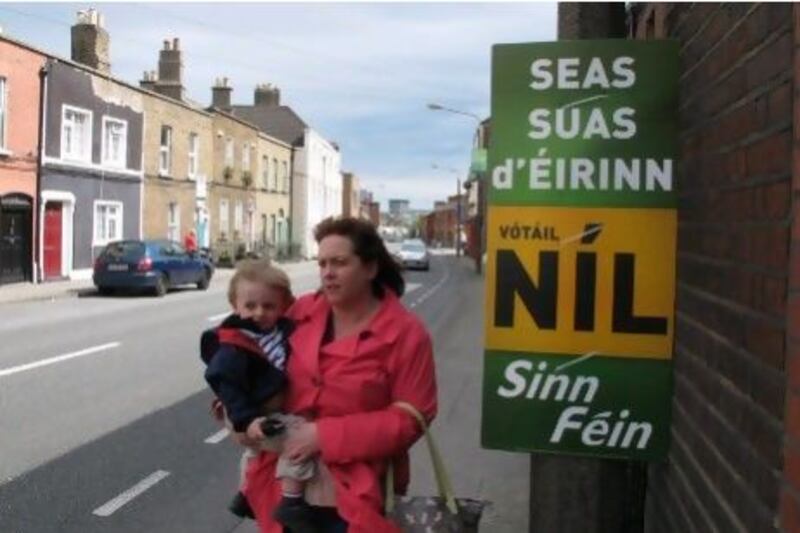DUBLIN // When voters in Greece and France got the chance, they dealt a resounding "No!" to the parties backing harsh austerity measures.
And the Irish could be next to give the European Union's debt-cutting plans a black eye.
A referendum here on May 31 will ask the public to approve an EU treaty that aims to control nations' annual deficits and longer-term debts. But critics say the treaty ignores the competing need to stimulate growth.
Ireland, once staunchly pro-EU but now increasingly euro-sceptical, is the only member of the bloc putting the agreement to a national vote.
Analysts of the three-year-old euro-zone crisis say an Irish rejection of the treaty - combined with Francois Hollande's victory as France's president last week and a hard-left turn in Greece's parliamentary elections - could force the continent to shift in favour of less cutting and greater investment in growth.
And they agree that, even if the fiscal treaty is ratified by the minimum 12 nations required, it is likely to be an economic dead letter before it comes into force next year. Its key goal - to bind nations into tighter debt and deficit limits under the threat of EU fines - seems downright perverse in the face of widening recession.
"This is the weakest treaty that the EU has ever come up with. It's rapidly been overtaken by events and looks increasingly meaningless," said Simon Tilford, the chief economist at the Centre for European Reform think tank in London.
There are a number of key issues driving the debate over the future of Europe's fiscal treaty.
Economists broadly agree that the EU powers that be, chiefly in Germany, remain in public denial about the real, underlying reasons for the euro-zone crisis - the faulty, half-baked design of the euro common currency, with no central coordination of debt funding.
Its repair, they say, will require the German chancellor, Angela Merkel, and her uneasy electorate to accept the need for national debts to become European property.
Colm McCarthy, an economist at University College Dublin and one of Ireland's foremost fiscal troubleshooters, described the treaty as "essentially an evasion, designed to provide political cover, particularly in Germany, for measures which will have to be contemplated if the crisis persists." He said its drafters seek to defend a fictional pretense "that Europe's problems derive entirely from budgetary excess".
Mr McCarthy argues that, had the fiscal treaty been law since the euro's launch in 1999, its supposedly tough spending rules would have made no difference in preventing the current banking and debt-financing problems, with the single possible exception of Greece because of its track record of fraudulent government accounting. Nor, he says, would the treaty forestall further debt crises.
Economists emphasize that the treaty contains broad get-out-of-jail-free clauses that permit higher deficits in cases of recession or unspecified external pressures.
Mr Hollande campaigned on the need for EU leaders to forge a new growth-focused agreement that reduces the dead weight of debt on the euro zone economies struggling the most. He says this will require the launch of eurobonds issued by the European Central Bank for funding the debt-refinancing needs of the entire 17-nation eurozone.
That idea is understandably detested by Mrs Merkel and many Germans, because it would transform other EU countries' separate debt-financing efforts into a European, and principally German, responsibility.
But the many critics of the eurozone system say this is exactly what the common currency needed from its infancy to combat the current funding crisis, which has already forced Greece, Ireland and Portugal to take EU-International Monetary Fund bailouts and is pushing eurozone heavyweights Spain and Italy down the same road.
Europe's political turmoil is complicating the Irish government's campaign this month to secure a majority "yes" vote for the treaty.
Economists say Ireland, along with fellow bailout recipients Portugal and Greece, cannot hope to avoid several years more of austerity no matter how they vote.
All are dependent on subsidized EU-IMF loans and will regain the power to resume normal borrowing on bond markets only when would-be investors are confident that these countries represent safe bets to repay their loans without any outside help.
That means reining in deficits that, in Ireland, stood at 13.1 per cent last year.
"The country is bust, and rejecting the treaty cannot alter that condition," Mr McCarthy said. "It could, however, make things worse."






